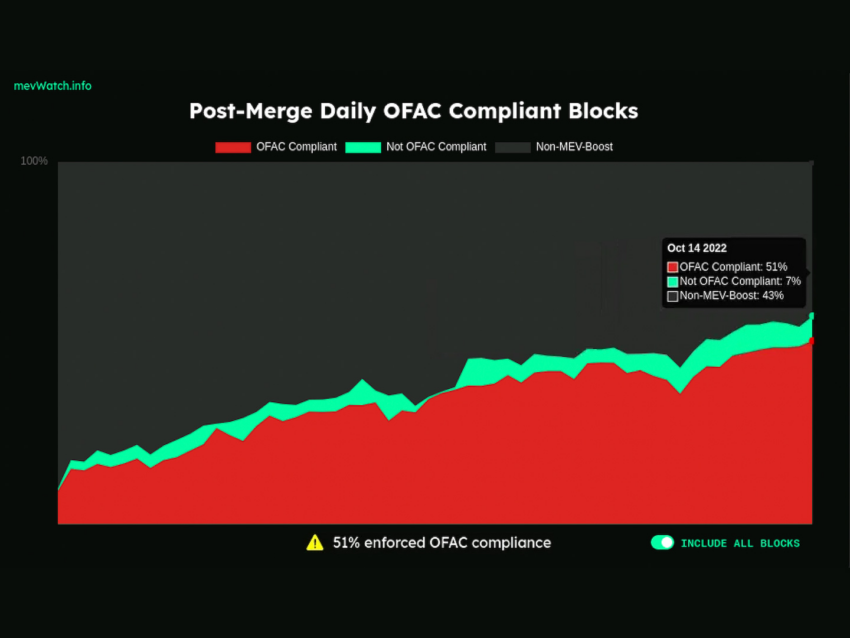Ethereum Maximum Extractable Value (MEV) boost-relays compliant with the U.S. Office of Foreign Assets Control (OFAC) rules are raising censorship concerns in the crypto market.
At press time, 51% of all Ethereum transaction blocks were determined to be OFAC compliant by MEV analytics site mevWatch info.
Ethereum Merge to Blame for The Rise in MEV-Boost Relays
Ethereum recent Merge changed its consensus protocol from işin kanıtı için kanıtı hissesini. This transition created a larger pool of validators than when the blockchain was a PoW network. The new validators use MEV-boost relays to maximize their yields on the new network.
MEV refers to techniques employed by miners to extract the maximum possible profit by reordering transactions in a new Ethereum block. One of the most popular techniques to achieve this is the so-called proposer/block-builder separation (PBS).
MEV-boost software, developed by Flashbotlar, is an implementation of PBS. A block proposer, or Ethereum validator in a proof-of-stake network, can increase their ETH stake etme rewards by up to 60% by selling blockspace to a pool of block builders.
To run an Ethereum validator düğüm requires staking a minimum of 32 ETH. If you don’t have 32 ETH, you can also stake smaller amounts in staking pools. Some of these include Lido and Roket Havuzu.
Of the seven top Ethereum MEV relays, only three do not censor broadcasted transactions forbidden by OFAC. The remaining four relays may not always censor transactions included in their transaction blocks. Still, they öyle yapacak if transactions prohibited by OFAC are broadcasted to the whole blockchain.
BloxRoute Max Profit, BloxRoute Ethical, and Manifold are Ethereum MEV-boost relays that do not censor transactions. According to Gnosis founder Martin Köppelmann, this is a sobering moment in the fight to keep Ethereum censorship-proof.

ETH researcher Dankrad Feist pointed out it’s important to remember that the validators are not to blame. The increased censorship happens when they connect to censoring and non-censoring relays. They are not themselves censoring the transactions.
Also, a validator might choose to censor transactions without using MEV-boost relays.
Was Luxor Technologies right in censorship predictions?
To reduce the likelihood of censorship, Ethereum co-founder Vitalik Buterin has made a öneri. Buterin said that block builders only be allowed to build part of a transaction block. This will still secure them to reap most MEV rewards without permitting abuse.
Before the completion of the ETH Birleştirme, mining pool operator Luxor Technologies uyardı the public. The firm said that Ethereum new proof-of-stake validation mechanism was more prone to censorship than Bitcoin proof-of-work system. It did not support the Ethereum Merge and stopped paying out mining rewards to ETH miners on Sep. 14, 2022.
The company also said that staking services offered by Lido and centralized exchanges Coinbase and Kraken are open to government censorship.
For Be[In]Crypto latest Bitcoin (BTC) analizi, buraya Tıkla
Feragatname
Web sitemizde yer alan tüm bilgiler iyi niyetle ve yalnızca genel bilgi amaçlı yayınlanmaktadır. Okuyucunun web sitemizde bulunan bilgilere göre yapacağı herhangi bir eylem kesinlikle kendi sorumluluğundadır.
Source: https://beincrypto.com/ethereum-transactions-no-longer-censorship-resistant/
